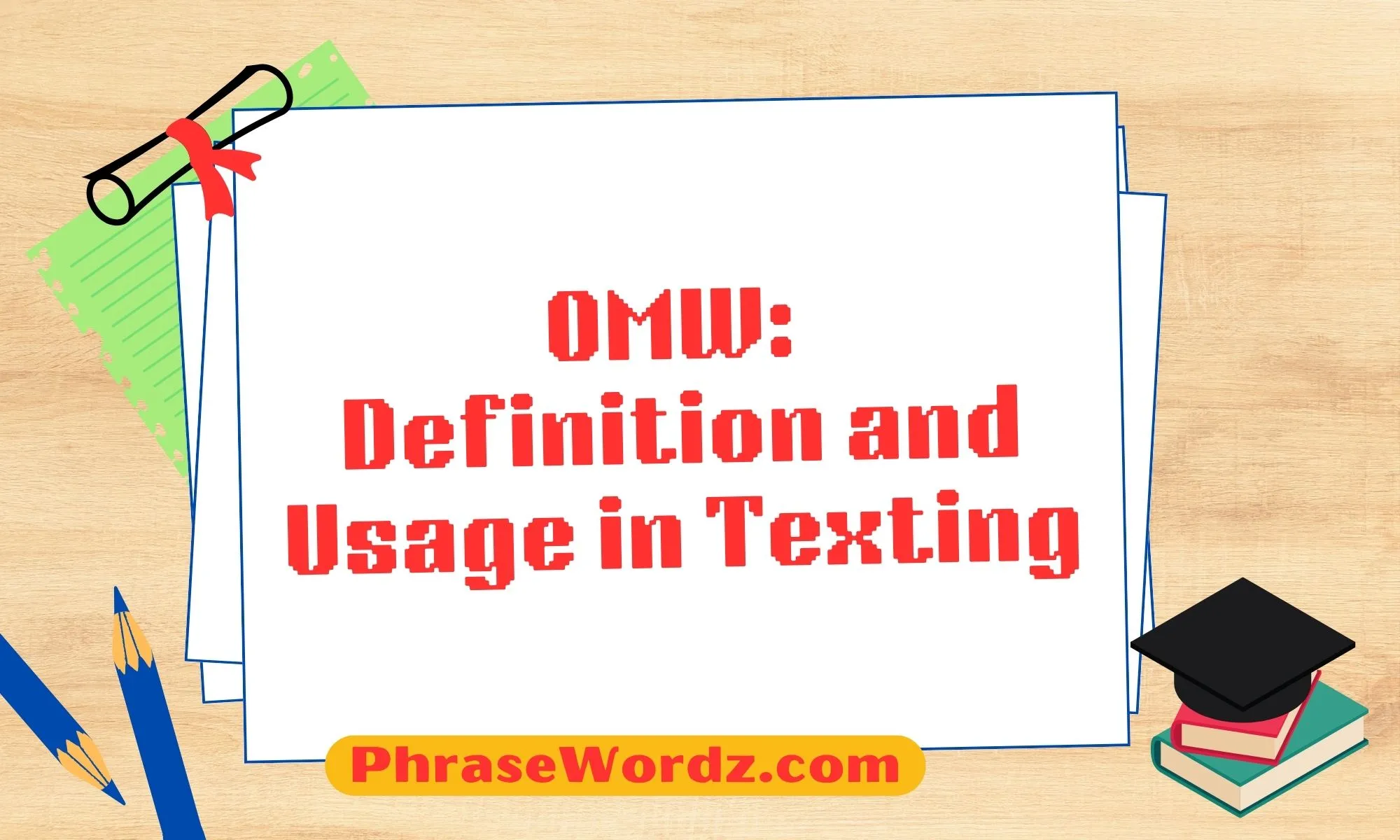Texting has revolutionized communication, offering a quick, efficient, and often casual way to keep in touch with others. One abbreviation commonly used is OMW, short for “On My Way.” While its basic meaning is straightforward, its context and usage can vary depending on the relationship, situation, and platform of communication.
“OMW Meaning in Texting: What It Stands For and How to Use It! OMW means ‘On My Way’ – a quick, friendly way to tell someone you’re en route. Perfect for casual texts, OMW keeps conversations short and engaging!”
What Does OMW Mean in Texting?
At its core, OMW means “On My Way,” indicating that the sender is en route to a location. It’s commonly used when someone is running late, arriving soon, or just leaving their current place. The usage of this abbreviation highlights speed and convenience, cutting down unnecessary words.
The Origins of OMW
Abbreviations in texting have been around since the early days of SMS, where character limits were strict. OMW emerged as a quick way to confirm someone’s imminent arrival without typing full sentences. Over time, this term spread to instant messaging apps, social media platforms, and emails.
OMW in Casual Conversations
In casual text conversations, OMW is used to reassure friends, family, or colleagues that you’re on your way. It’s often informal, direct, and does not require detailed explanations.
Scenario: Casual Message to a Friend
Elizabeth:
“Hey Darcy! I’m leaving now. OMW, be there in 10!”
In this scenario, OMW is a relaxed, friendly confirmation that the sender is heading toward their destination. There’s no urgency or formality, just a quick update.
OMW in Professional Contexts
When used in a professional setting, the abbreviation can still maintain its core meaning, but a slightly more formal tone may be appropriate depending on the relationship.
Scenario: Work Email
Subject: OMW to the Meeting
Elizabeth:
“Dear Darcy,
I just wanted to let you know that I’m currently on my way to the office. OMW and should arrive within 20 minutes. Please feel free to start without me if necessary. I’ll join as soon as I can.
Best regards,
Elizabeth”
This email still uses OMW, but the formality of the greeting and additional context elevates the tone, suitable for professional correspondence.
OMW in Urgent Situations
In an urgent situation, using OMW conveys immediate movement and often includes a sense of urgency or reassurance.
Scenario: Emergency Situation Text
Elizabeth:
“Darcy, I’m so sorry about the delay. OMW now, I’ll be there in 5 minutes! Hang tight, almost there!”
This shows a more emphatic use of OMW. The extra explanation after the abbreviation gives context, reassuring the recipient that the sender is hurrying.
OMW When Running Late
Sometimes, people use OMW to indicate they are on the way, even if they’re actually still preparing to leave. This can help buy time when running late.
Scenario: Running Late Text
Elizabeth:
“Darcy, so sorry, just getting out the door now. OMW but I might be about 15 minutes late!”
Here, OMW provides the recipient with reassurance that the sender is coming, despite the added disclaimer about the delay.
OMW in Social Media
On platforms like Twitter, Instagram, or Facebook, OMW is often used to signify upcoming travel or movement to a specific location, event, or meet-up.
Scenario: Social Media Status Update
“Finally finished work! OMW to the beach now for some well-deserved relaxation!”
In this case, OMW becomes a public declaration of movement, indicating the sender’s plans for anyone who might be interested.
OMW in Group Chats
In group chat situations, OMW helps let multiple people know about a person’s whereabouts. It’s a simple way to update everyone in one message.
Scenario: Group Chat Text
Elizabeth:
“Hey everyone, I’m wrapping up here at work. OMW now, see you all soon!”
This context is efficient, allowing Elizabeth to inform the group without needing to message each person individually.
OMW with Directions or Time Estimates
Sometimes, OMW is accompanied by a time estimate or further information about the route being taken, which helps the recipient gauge the sender’s arrival.
Scenario: Text with Directions
Elizabeth:
“Just left the house. OMW, should be there in 15 minutes according to Google Maps.”
By adding a time estimate, this message gives more clarity to the recipient about when to expect the sender.
OMW for Virtual Meetings
In virtual spaces, OMW can also apply when someone is about to join an online meeting, signaling their imminent presence in the virtual room.
Scenario: Virtual Meeting Message
Elizabeth:
“Hey Darcy, OMW to the Zoom call now. Just finishing up another meeting, so I’ll be there in 5 minutes!”
The abbreviation translates well to the virtual environment, ensuring the recipient knows the sender is on their way, even though it’s a digital space.
OMW in Travel Contexts
When used in the context of long-distance travel, OMW can indicate that a journey has started, even if the person is still some time away.
Scenario: Travel Text
Elizabeth:
“Hey Darcy! Just boarded the plane. OMW, see you in a few hours when I land!”
Here, OMW is used more broadly, covering the entire duration of a flight, and it reassures the recipient that the journey is already in motion.
OMW in Romantic Settings
In romantic settings, OMW can take on a more affectionate tone, often used between partners to signify anticipation or excitement.
Scenario: Romantic Text
Elizabeth:
“Darcy, can’t wait to see you. OMW and I’ve got a surprise for you!”
This use of OMW has a warmer, more personal feel, with added excitement conveyed through the tone.
OMW in Apologetic Contexts
When someone is late or has kept someone waiting, OMW can be used as a sincere apology.
Scenario: Apology Text
Elizabeth:
“Darcy, I’m so sorry I’m running behind. Just finished up here, and I’m OMW now. I’ll be there as soon as I can!”
In this case, the use of OMW is paired with a direct apology to make the sender’s regret and intent clear.
OMW with Additional Information
Sometimes, OMW is not enough, and the sender needs to give additional context or details.
Scenario: Text with Context
Elizabeth:
“Hey Darcy, just finishing up with my last client. OMW to the dinner, but it’s looking like I’ll arrive around 7:30.”
By offering more details, this text reduces ambiguity and gives the recipient a better understanding of the sender’s situation.
OMW in Anticipation
OMW can also express anticipation or excitement, especially when referring to events or experiences.
Scenario: Excited Text
Elizabeth:
“Darcy, just got off work. OMW to the concert! I’m so pumped for this!”
In this case, OMW reflects the sender’s eagerness to participate in something enjoyable.
OMW in Reminder Contexts
Sometimes, OMW is used as a subtle reminder or nudge for someone waiting.
Scenario: Reminder Text
Elizabeth:
“Hey Darcy, just wanted to let you know I’m still OMW! Should be there soon.”
This text is polite but serves as a gentle reminder that the sender is en route and hasn’t forgotten the recipient.
OMW When Making Plans
OMW can be part of coordinating plans, especially when changes or delays occur.
Scenario: Plan Adjustment Text
Elizabeth:
“Change of plans, but I’m still OMW to the café. Running about 10 minutes behind, but see you there soon!”
In this message, the sender is ensuring that despite changes, they are still en route.
OMW with a Sense of Finality
OMW can also signal a sense of finality or conclusion, indicating that after a long wait, the person is finally en route.
Scenario: Final Message After Delay
Elizabeth:
“Darcy, after all the delays, I’m finally OMW! I’ll be there before you know it.”
This usage emphasizes that the waiting period is over, and the sender is now on their way.











